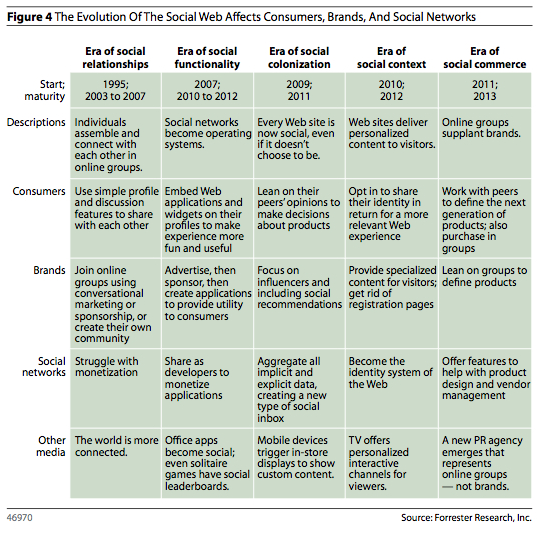The “Post-Marketing” and Social Commerce Era

In a recent Business Marketing Institute “Tuesday Marketing Notes,” the concept of “Post-Marketing” was introduced because of the way “prospects have changed the way they learn about, research, and buy products and services in B2B markets, using the Internet and Google instead of trade publications, trade shows, and other conventional marketing media to learn about and evaluate new products for their companies.”
Certainly social media has made an impact on B2B buying as individuals in the buying center turn to social network tools to see what challenges their industrial peers are having and find out what works and doesn’t work regarding product or technology purchase decisions. And in its ongoing postings, the BMI shares a compelling perspective that B2B marketers should pay attention to.
Also coming out this week is a Forrester Research report by Jeremiah Owyang entitled “The Future of the Social Web” that is worth reading if you have the budget. If you don’t have the budget, you can always read Jessica Tsai‘s article in Destination CRM.
The report breaks down th evolution of the Social Web into five phases and characterizes each phase in terms of when it occurred/will occur, what makes it distinct from the other phases, new consumer behavior, new brand “behavior,” social network “behavior,” and major effects upon other media. The table below is excerpted from the report:

The Marketing Consigliere finds the two perspectives of a “Post-Marketing” age and an eventual “Social Commerce” era very interesting. One question he poses to the brand management professionals out there is what happens when during the Era of Social Commerce, online groups supposedly “supplant” brands.
Everyone would probably agree that brands won’t go away and their “power” will be diminished in some fashion, but how does an online group “supplant” a brand? Would it be bold to say that the online group itself “becomes” a brand? That through its influence and knowledge an online group “promises an experience,” much as a brand is supposed to do? And as that influence and knowledge grows, others will seek out the “brand” of the online group to fill their needs?
